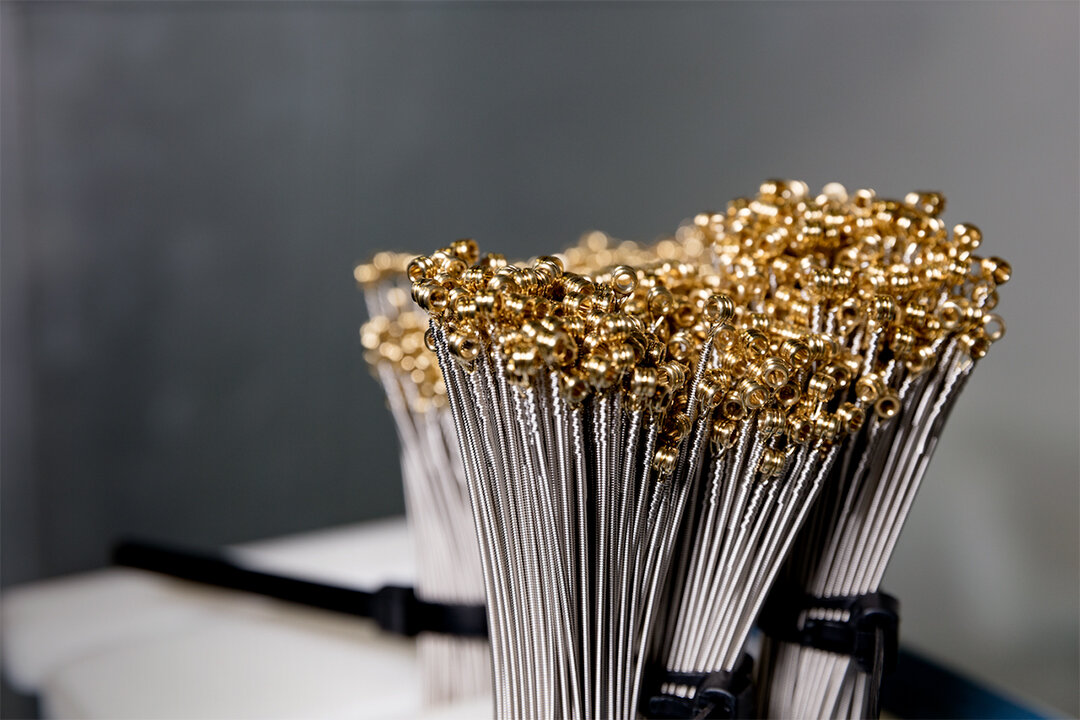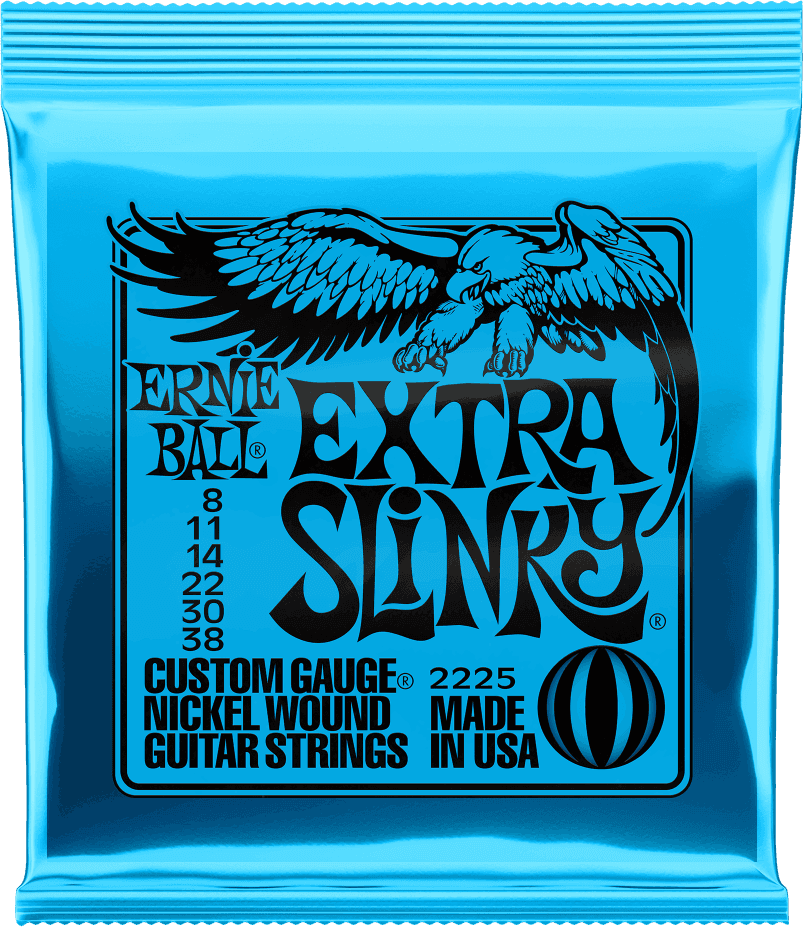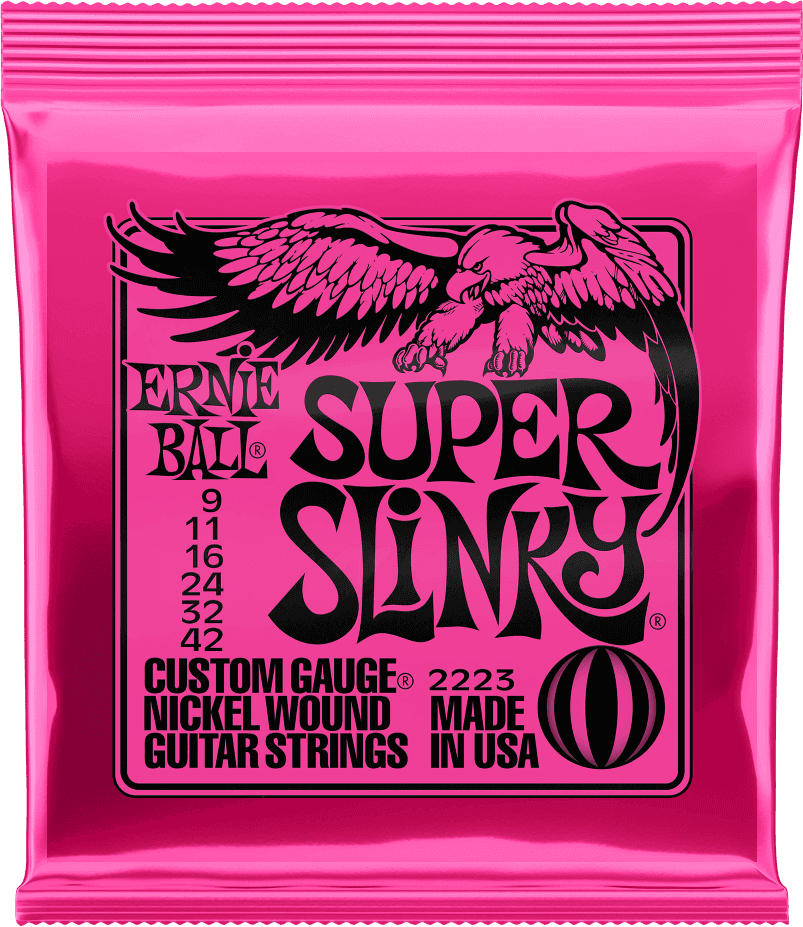Ernie Ball Buyers Guide - Which Ernie Ball Strings Do I Choose For My Electric Guitar?
Ernie Ball manufactures over 200 varieties of electric guitar strings in a diverse selection of materials, string gauges, and styles. Whether you are a beginner or a professional guitar player, you can find the right strings for your level and guitar type with this electric string buyers guide.
Electric Guitar String Gauges
Electric guitar strings, like acoustic guitar or electric bass strings, are manufactured in a range of thicknesses or gauges. The gauge of an electric guitar string has a large influence on the playability and sound in addition to other factors like the string material.
Light Gauge
— Easier to bend and play, so ideal for beginner guitar players with uncalloused hands
— Ideal for vintage electric guitars
— Even projection with bright sound
Heavy Gauge
— Require more finger pressure to fret and bend notes
— Hotter output with punchy tone
— Are preferred for low tunings such as Drop D, Drop A, etc.
— Exert more tension on the guitar neck
Electric Guitar String Materials
Electric guitar strings are made using various metal alloys which have a significant impact on the strings’ sound. Here are some general tonal characteristics of the most common types of strings:
— Nickel: Balanced brightness and warmth
— Cobalt: Wide dynamic range with increased low end and crisp highs
— M-Steel: Rich and full tone with powerful low end response
— Pure Nickel: Vintage output with a warm tone
— Stainless Steel: Bright, crisp, “edgy” tone with corrosion resistance
COMPARISON ERNIE BALL ELECTRIC GUITAR STRINGS
Ernie Ball electric guitar strings come in a lot of variations and in different materials as described above. The most popular are the Nickel Wound Slinky. Below we give you a brief overview of the different types of Ernie Ball electric guitar strings.
Slinky Nickel Wound
Ernie Ball Regular Slinky strings are the best-selling electric guitar strings worldwide. They are the favorite strings of Eric Clapton, John Mayer, Steve Vai and a lot of other guitarists worldwide. Regular Slinky wound strings are made of a steel wire wrapped with nickel and wrapped around a hexagonal steel core wire. The unwound strings are made from a special hardened tinned carbon steel that provides a balanced sound.
Slinky Paradigm
Thanks to a special winding wire, these strings are 70% more resistant to dirt and fatigue. The Paradigm winding wire uses an exclusive process in which strings are removed and the corrosion resistance is significantly improved by treating the strings with plasma (electricity). The Ernie Ball Paradigm strings last very long and hardly break.
Slinky Cobalt
Ernie Ball Cobalt Slinky strings give you an extended dynamic range, more harmonic response, an extended range in the bass and clear, high tones. Cobalt provides improved magnetic transmission from the strings to the pickups than any other alloy available. Cobalt Sinky strings are also softer to play, making bending a lot easier.
Slinky M-Steel
Maraging steel is a superalloy used in the aerospace and weapon industries and is extremely strong. The wound strings of the Slinky M-steel strings are made from a patented Super Cobalt alloy wrapped around a hexagonal "Maraging" steel core wire. This creates the typical M-steel sound: a richer and fuller sound with powerful low tones. A patented winding on the ball end of the unwound strings ensures that these strings break and detune less quickly than regular strings.
Slinky Classic Rock ’N Roll Pure Nickel
The wound strings of these sets are made of pure nickel winding wire wrapped around a hexagonal steel core wire giving them a very warm and full sound with that typical Slinky feel. These were actually the very first popular electric guitar strings in the 1950s and 60s.
Slinky RPS
The Ernie Ball RPS wound strings are made of special gauges of winding wire and core wire that are different from other electric guitar strings. This gives you more harmonic sounds with that typical Slinky feel. The unwound strings stay in tune better and last longer than other types of strings. A patented winding with copper wire on the ball end of the unwound strings ensures that these strings break and detune less quickly than ordinary strings. These strings also last a lot longer.
Slinky RPS Coated Titanium
The characteristic strength of titanium ensures that strings break less quickly and remain in tune better than ordinary strings. In addition, these strings are treated with a patented Ernie Ball coating so that the strings retain the feel and sound of uncoated strings, but still last a lot longer.
Slinky Stainless Steel Wound
These strings are made of a stainless steel wire wrapped around a hexagonal steel core wire that has been treated with tin. The non-surrounding strings are made of carbon steel which is extremely durable. These string sets have a very bright tone and last longer than regular strings.
Light Electric Nickel Wound
Best known as jazz sets. These Ernie Ball Light Nickel Wound string sets all have a wound G string. Like all Ernie Ball strings, these types can not only be used for jazz, they are also perfectly usable for other genres such as alternative, rock and pop.
Half Sizes Slinky
These sets are new combinations of the famous Slinky strings. For example, Primo Slinky strings are neatly positioned between the popular Regular Slinky and Super Slinky strings in terms of gauges, so that they give you a balanced and comfortable feeling over all strings. This combination is perfect for guitarists looking for strings that play a little easier, but have little or no tonal differences. Mega Slinky strings are ideal for guitarists looking for a thicker sound with only small differences in tension and playing feel.
Mixed Sizes
These Slinky sets combine the best of the already existing Slinky sets. The Burly Slinky, for example, combines the two popular Power Slinky and Skinny Top Heavy Bottom sizes for a slightly thicker sound. The Ultra Slinky set combines the popular Regular Slinky and Power Slinky sets.
WHICH STRINGS ARE IDEAL FOR ME?
It is difficult to answer which strings are best for you. Everything depends on what kind of music you play, what kind of guitar you play, are you a beginner or have you been playing guitar for a long time, do you play in standard tuning or in drop tunings, etc. Strings are something personal and based on this, the buyers guide can give you a good idea of which strings are best for you.
The best way to see which strings are ideal for you is to compare them. Buy a number of different types and put them all on your guitar in 1 to 2 weeks. This way you can compare and experience which types suit you best. Ernie Ball also has handy Tone Packs in which the 3 most sold types are collected. The Tone Packs come in the two most popular gauges, in 9-42 and 10-46.



















